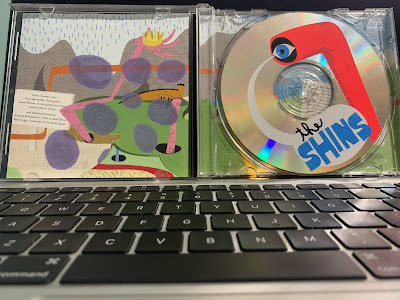Six years makes for a lot of water under the bridge, perhaps even the ocean's worth suggested by The Fleet Foxes's cover art for Crack Up. The band's first two albums in retrospect seem like the high water mark of the indie-sincerity wave of the 2000s. Beginning with The Shins and Iron and Wine, trundling through Death Cab for Cutie and Sufjan Stevens before finally peaking on the backs of Bon Iver and Fleet Foxes, only to smash its self to bits on the rocky shoals of Mumford and Sons. The wave has long since rolled back and as Crack Up opens Robin Pecknold sounds rather like a maritime ghost, lolling back to shore on an indifferent tide.
The muted, out-of-tune opening of first track I Am All That I Need/Arroyo Seco/Thumbprint Scar sets a tone of wounded uncertainty. Pecknold might be singing "I'm all that I need," but it sounds more like a left over lyric from headier days when he actually believed that to be true. The second section kicks up in the established Fleet Foxes fashion with sweeping percussive strumming and lush instrumentation but it takes a few moments for the trundling sleepy voiced ghost to move aside and let things begin in earnest.
The songs on Crack Up do not have the immediacy of the Foxes' previous efforts. There's no White Winter Hymnal or Grown Ocean. On first listen they seem to be merely describing the style Fleet Foxes built for themselves of neo-folk convention and widescreen ambition. For fans who've been waiting, remembering those first bracing listens of their self titled debut nine years ago or the relief of the worthy second album, a mere six years ago, Crack Up may be frustrating on its first couple listens. There are no stand outs. But there are long passages of the superficially familiar so the comfort of it might keep them coming back often enough to discover that this is an enchanting album.
On the third listen, Cassius, a second track that does not begin until the seven and a half minute mark is elegant and warm. The singles Fools Errand and If You Need To, Keep Time On Me, that on their own felt like underwhelming style exercises, in context become part of the tapestry. Therein is the novelty and the gear shift Fleet Foxes have undergone. Their old way was to deliver ornate but tightly wound sample pieces, compressed gems. Crack Up is a larger piece with patterns that emerge over further stretches of space. What first seems empty space reveals its self eventually as part of a larger set of features.
The listener may forgivably mourn the loss of their previous exuberance. But Fleet Foxes have delivered a patient large scale work that repays the listener's own patience and attention with lovely melodic expanses and the admirable craftsmanship that more than answers the question, "What were you doing for six years?"


